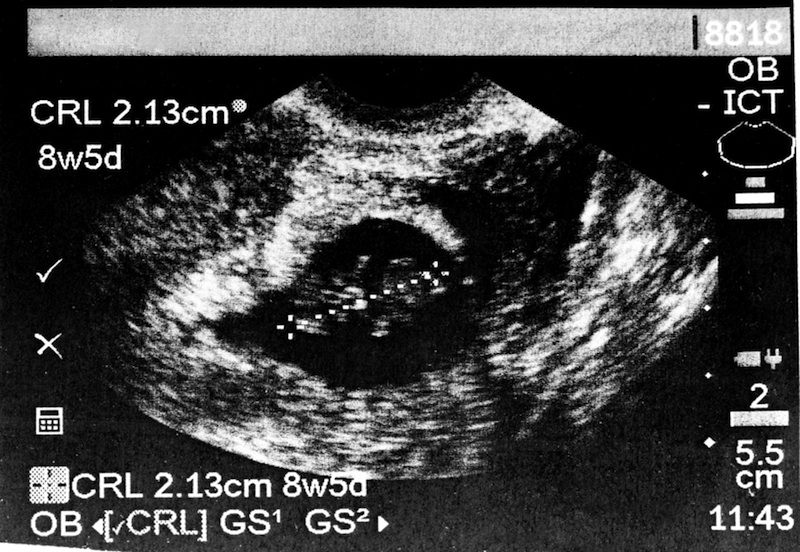Fetal Testing Could Intensify Abortion Wars

Get the world’s most fascinating discoveries delivered straight to your inbox.
You are now subscribed
Your newsletter sign-up was successful
Want to add more newsletters?

Delivered Daily
Daily Newsletter
Sign up for the latest discoveries, groundbreaking research and fascinating breakthroughs that impact you and the wider world direct to your inbox.

Once a week
Life's Little Mysteries
Feed your curiosity with an exclusive mystery every week, solved with science and delivered direct to your inbox before it's seen anywhere else.

Once a week
How It Works
Sign up to our free science & technology newsletter for your weekly fix of fascinating articles, quick quizzes, amazing images, and more

Delivered daily
Space.com Newsletter
Breaking space news, the latest updates on rocket launches, skywatching events and more!

Once a month
Watch This Space
Sign up to our monthly entertainment newsletter to keep up with all our coverage of the latest sci-fi and space movies, tv shows, games and books.

Once a week
Night Sky This Week
Discover this week's must-see night sky events, moon phases, and stunning astrophotos. Sign up for our skywatching newsletter and explore the universe with us!
Join the club
Get full access to premium articles, exclusive features and a growing list of member rewards.
Genetic testing is increasingly able to tell parents more about their fetuses with less risk than ever before. But without better regulation, these tests could become the target of anti-abortion groups, a health-law expert says.
Writing this week in the journal Nature, Jaime King of the University of California Hastings College of Law warns that early, noninvasive genetic tests for fetuses are becoming increasingly common — but regulation of these tests isn't keeping up. So far, these noninvasive prenatal tests (NIPTs) are offered for a limited range of genetic diseases under a doctor's supervision, King said. That could soon change.
"There are about 50 startups that have been created to look at NIPT technology, and there's nothing that would really prevent them from offering it direct-to-consumer," King told LiveScience. "There's such an interest from prospective parents in knowing as much as they can about their fetus, that if they could do a blood test at home, there would likely be a market for that."
Noninvasive testing
Noninvasive prenatal tests use maternal blood, not amniotic fluid, to screen for genetic abnormalities. Because tests that use amniotic fluid require puncturing the amniotic sac around the fetus, those methods can increase the risk of miscarriage. Not so for NIPTs, which can also be used earlier in pregnancy. [7 Diseases You Can Learn from a Genetic Test]
These technological leaps are occurring at the same time that state legislatures are increasingly pushing anti-abortion laws, creating potential conflict given that news of an untreatable genetic disorder might prompt the choice to abort, King said. Four states have already banned abortion on the grounds of the fetus' sex, and a bill introduced in Missouri would also forbid abortion on the basis of a "genetic abnormality diagnosis."
Too much information?
Get the world’s most fascinating discoveries delivered straight to your inbox.
It's not clear whether the Missouri law will have much traction — it's currently not on the state legislative calendar — but genetic testing is an area where regulation lags behind technology. Companies such as 23andMe already offer direct-to-consumer genetic testing for adults by mail-in kit; meanwhile, researchers at the University of Washington and Stanford University have independently sequenced whole fetal genomes using only a pregnant woman's blood. (Fetal cells can cross the placenta and circulate in a mother's bloodstream.) [8 Odd Changes That Happen During Pregnancy]
"Once we're capable of doing that and making it commercially available, at that point, the real fear is that parents will get inundated with a flood of information about their fetus and not really understand what the full range of implications are," King said.
Companies that currently market these tests have taken a conservative approach, offering them through doctors' offices only. San Jose, Calif.-based company Ariosa Diagnostics, the maker of a test that can detect common genetic problems as early as 10 weeks into a pregnancy, calls itself "fully committed to the responsible introduction of our service."
"The tests should be ordered only through a health-care provider as the provider will need to explain and counsel the patient on the benefits and limitations of testing, other testing options, as well as how to interpret the results," Ariosa CEO Ken Song told LiveScience.
Similar concerns of information overload have come up for direct-to-consumer genetics tests for adults, but prenatal testing has an extra layer of controversy, given that the only option for many conditions is the choice to abort or continue the pregnancy. (Research is ongoing on gene therapy in the womb to cure fetuses before they are born, but treatments won't be available anytime soon.) As tests become available for more conditions — and even expand to the whole genome — these choices may get more complicated. Forget the question of whether to abort a fetus with Down syndrome; what about a fetus with a higher-than-average risk of developing early heart disease or dementia at age 40? [10 Worst Hereditary Conditions]
Prenatal testing and abortion
Anti-abortion groups, for their part, do not necessarily oppose prenatal testing, but do often oppose abortion in response to those test results.
"Our model (the same one as the sex-selection ban) prohibits abortion when it is done solely because the unborn child has been diagnosed with Down syndrome or a genetic abnormality," Americans United for Life's legal team told LiveScience in an email.
King worries that legislative pushes by groups like Americans United for Life could lead to the government attempting to draw lines between what genetic diseases represent "acceptable" reasons for abortions and which don't. It's easy to imagine the controversy that would result: Should parents have to carry a fetus with Tay-Sachs disease, an incurable neurological disorder that slowly paralyzes and kills a child by age 4 or so? What about Down syndrome, which can come with life-threatening physical complications and major challenges, but which does not at all preclude a fulfilling life? What about Parkinson's disease, a deadly neurological disorder that doesn’t usually set in until age 50 or so?
"It's highly likely that this will get involved in the abortion wars," said Hank Greely, a Stanford University law professor who was not involved in King's editorial but who specializes in the legal implications of new biomedical technology.
One of the first issues that will likely catch fire, Greely told LiveScience, is in early testing for the sex of the fetus, which is the "easiest thing to test for" using maternal blood. Restrictions on sex-selective abortions are relatively easy to pass, King said, because most people agree that abortions solely based on sex are a bad thing. On the other hand, she said, these laws open up the avenue of asking women why they're choosing abortion, a new area that could lead to more laws differentiating "good" from "bad" abortions.
"I would like for people to understand that if you are voting in favor of a sex-selective abortion ban, then what you are really doing is opening the avenue toward much larger restriction on abortion," King said.
The prenatal testing wars may also end up echoing the recent contraception wars, which present the question of who pays, Greely said. States have some leeway in determining what Medicaid will pay for, and it's possible that conservative states will see noninvasive prenatal testing as a gateway to more abortions and so refuse to fund them through Medicaid. Because Medicaid pays for 40 percent of U.S. births, that refusal could have huge repercussions. Women with money or good insurance could afford the tests; poor women and women without good insurance could not.
"I think we need to start paying attention to this issue now," Greely said. "It's not yet at the explosive point, but that's coming soon."
Follow Stephanie Pappas on Twitter @sipappas or LiveScience @livescience. We're also on Facebook & Google+.

Stephanie Pappas is a contributing writer for Live Science, covering topics ranging from geoscience to archaeology to the human brain and behavior. She was previously a senior writer for Live Science but is now a freelancer based in Denver, Colorado, and regularly contributes to Scientific American and The Monitor, the monthly magazine of the American Psychological Association. Stephanie received a bachelor's degree in psychology from the University of South Carolina and a graduate certificate in science communication from the University of California, Santa Cruz.
 Live Science Plus
Live Science Plus










